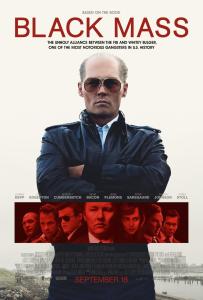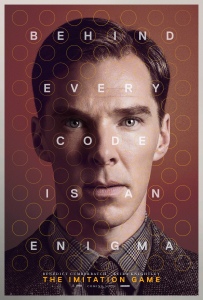 The best scene in “Black Mass”, a biopic on the life of Boston’s notorious gangster James “Whitey” Bulger, is when a naïve, young waif of a girl is picked up by Bulger and her stepdad after spending the night in jail. Bulger grills her on exactly what the police asked of her and how much she knows. What’s exciting about the scene is not the fear of what Bulger might do but how oblivious she is to all the danger she’s in.
The best scene in “Black Mass”, a biopic on the life of Boston’s notorious gangster James “Whitey” Bulger, is when a naïve, young waif of a girl is picked up by Bulger and her stepdad after spending the night in jail. Bulger grills her on exactly what the police asked of her and how much she knows. What’s exciting about the scene is not the fear of what Bulger might do but how oblivious she is to all the danger she’s in.
The amusing nature of this exchange may be entirely unintentional. We know exactly what Bulger’s going to do with her. Director Scott Cooper has reduced Bulger into a monster, not even a ruthless human being with a hint of dimension. He kills and has people kill for him, and his fuse is so short that any sense of his humanity, or of those around him, is long gone.
Appropriately, Johnny Depp plays Bulger with an alien sensibility in line with his equally eccentric performances for Tim Burton and others. Thin, slick-backed gray hair, a forehead that dwarfs even his massively dark old-man sunglasses, and piercing blue eyes make him more vampire than gangster.
But Depp’s performance feels hollow in a movie that has little substance or real style behind it. “Black Mass” documents Bulger’s rise to power in the South Side of Boston during the ‘70s and ‘80s when Bulger became an informant for the FBI and his old childhood buddy John Connolly (Joel Edgerton). Connolly believes by looking the other way on Bulger, his intelligence can help the agency land a more significant Italian mafia family. But once the mob is out of power and Bulger is given a free reign of terror, the movie loses its steam. Cooper bookends the film with interview testimonials of Bulger’s crew making confessions, so there’s no tension to if or when Bulger and Connolly’s jig will be up.
Cooper has some talent as a director, but not as a storyteller or stylist. He borrows plenty of Scorsese-isms from other greater and equally mediocre gangster films, but adds none of the themes of morality or loyalty to any significant degree. It results in a lot of empty killings and point blank shootings in broad daylight, a lot of penetrating death stares and friendly conversations turned tense. Cooper staged similar scenes of dire gravity and violent melodrama in his last film, “Out of the Furnace.” But the Americana trappings found there had no bearing to social issues either, as though staging these scenes was enough to make such themes emerge.
“Black Mass” also falls into a trap of some unfortunate casting and poor usage of its talented cast. Joel Edgerton is so blindly a hot-head, the antithesis to Depp’s low-key hiss, that it’s a wonder he’s able to pull the wool over his superiors’ eyes. People like Dakota Johnson, Peter Sarsgaard, Corey Stoll, Jesse Plemons and Juno Temple are in the film so briefly they barely register. And if it seemed like there was nothing Benedict Cumberbatch could not do, make the Brit don a Boston accent and you may have found it.
In an interview with the police, one of Bulger’s cohorts is asked his opinion of his boss. “He’s strictly criminal.” “Black Mass” is so flat and generic that it can’t be held in much higher esteem.
2 ½ stars
 No one goes into making a movie trying to make an “Oscar movie”, which with eight nominations and Best Picture frontrunner status, “The Imitation Game” has easily been for some time. But a director will go into a film trying to convey a person’s importance. Those fawning biopic qualities of genius in Morten Tyldum’s film overshadow the crafty genre picture of numbers and intellect waiting to be decoded.
No one goes into making a movie trying to make an “Oscar movie”, which with eight nominations and Best Picture frontrunner status, “The Imitation Game” has easily been for some time. But a director will go into a film trying to convey a person’s importance. Those fawning biopic qualities of genius in Morten Tyldum’s film overshadow the crafty genre picture of numbers and intellect waiting to be decoded.